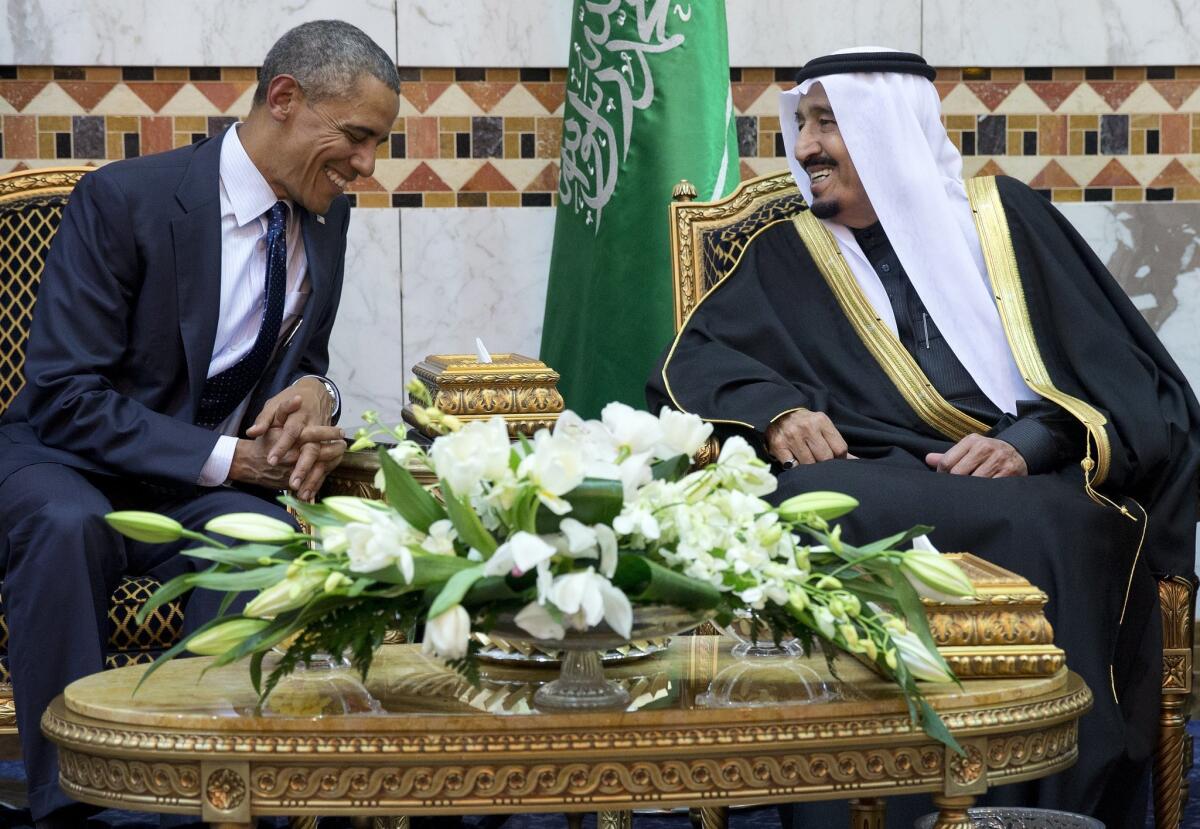Op-Ed: A security treaty with Iran’s potential victims could ensure deal compliance

The heart of the opposition to the nuclear deal with Iran is the fear, even the assumption, that Iran will violate it, cheating on inspections and using the accord’s provisions to double-deal and weaponize.
Opponents often cite North Korea’s violation of its deal with the West in 2003. But they fail to mention that even after North Korea became a nuclear state, an insurance system was in place so that it could not become a regional force. North Korea could only move so far without precipitating a confrontation with America because the United States had defense treaties with South Korea, Japan, Australia and the Philippines.
If we don’t trust the Iranians — and why should we? — then we need similar arrangements with Israel and the concerned Arab states, Iran’s adversaries in the region who are close to the U.S. Alongside the agreement with Tehran, we can offer these states a network of formal commitments guaranteeing that an attack by Iran on any of those countries would be considered an attack on the United States.
To some extent, American security guarantees to Israel and the Saudis are already implicit. But new, firmer assurances, especially if codified in a bilateral treaty with Israel and a multilateral pact or series of arrangements with several Arab states, would be permanent and unmistakable, no matter who was in the White House.
Such measures would sharply reduce the chance of miscalculations by Iran; its leaders could not delude themselves into thinking that there would be no consequences if they threatened or attacked one of their neighbors — the kind of delusion under which North Korea invaded South Korea in 1950, after the United States left unclear its interest in defending the Korean peninsula.
In fact, in early 2008, both Democratic presidential candidates, Barack Obama and Hillary Rodham Clinton, went on the record about extending the U.S. “security umbrella” to Israel if Iran obtained nuclear weapons. Clinton added that she would “provide a deterrent backup” beyond that as well, including Europe, Japan, Saudi Arabia, Kuwait and other Arab countries, and guaranteeing “massive retaliation” if Iran targeted Israel or America’s Arab allies.
President Obama has already reached out to Saudi Arabia’s King Salman and Israeli Prime Minister Benjamin Netanyahu about the Iran deal framework. He declared in an interview over the weekend that he’s willing “to make the kinds of commitments that would give everybody in the neighborhood, including Iran, a clarity that if Israel were to be attacked by any state, that we would stand by them,” and he said he would use a Camp David meeting to “formalize” security assistance for Arab allies.
Some may question such outreach and may even be astonished at the notion of providing a new specific defense commitment to an Israeli leader who has acted as if he were a member of America’s Republican Party and has been the world’s most vocal opponent of a nuclear deal. And yet accepting such an American offer would end Netanyahu’s bitter opposition to Obama’s policy and a finalized deal.
A defense treaty would offer the Israeli prime minister a means not only of increasing deterrence against Iran but also a means of reversing the decline in the U.S.-Israeli relationship. It would serve as the most authoritative message that the Iranians could have that they would face a certain and strong American reaction if they threatened Israel.
Egypt, Jordan, Saudi Arabia and the United Arab Emirates (and possibly such Gulf Cooperation Council states as Kuwait, Oman, Qatar and Bahrain) ought to welcome such a commitment — and protection — as well. It would assure them of American engagement in their region and reduce the likelihood of the oft-discussed U.S. pivot to Asia. These are very difficult times for these Arab states, particularly in their struggles with Islamic State and other radical groups, and Iran, and they need all the help they can get, even though they do not trust the U.S. completely. Their adversaries too would understand that they have the full backing of the U.S. It is the right moment to establish such close ties. The U.S. and these Arab states face common threats — in Syria, Iraq, Libya, and Yemen — and that has led them to create varying forms of coalitions, including military ones.
In the end, neither Netanyahu nor the Arab leaders could afford not to accept America’s guarantees and cease working against the deal that had been reached.
Iran’s potential victims and many in the United States are justifiably concerned about the nuclear deal. A series of defense pacts with Israel and these Arab states is the best route to assuage these concerns, make sure that Iran abides by its commitments and create a more secure region with positive global implications.
Steven L. Spiegel is a professor of political science and the director of the Center for Middle East Development at UCLA and a scholar at the Israel Policy Forum.
Follow the Opinion section on Twitter @latimesopinion and Facebook
More to Read
A cure for the common opinion
Get thought-provoking perspectives with our weekly newsletter.
You may occasionally receive promotional content from the Los Angeles Times.










